Family shakes off poverty in Shannan, Tibet
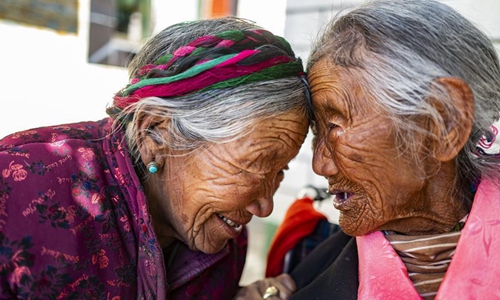
Sonam Drolma (R) interacts with her sister in Reguo Village of Gyaca County in Shannan, southwest China's Tibet Autonomous Region, March 24, 2020. Saturday marks the Serfs' Emancipation Day. Sixty-one years ago, more than one million people, or 90 percent of the region's population of that time, were liberated from the feudal serfdom. Sonam Drolma is a 109-year-old villager in Reguo Village of Shannan. Since she was born, she has gone through half a century of twists and turns and sufferings as a serf. As a descendant of serfs, Sonam Drolma began to work for serf owners at the age of 15. Sonam served as a serf for 47 years, witnessing her parents and brother die at an early age because of the overwork and poor living conditions. After the democratic reform, she owned the land, houses, cattle and sheep that she had never dreamed of. Since then, she never had to live the life being exploited and oppressed. Then Sonam Drolma gave birth to her daughter. After China's reform and opening up in early 1980s, Sonam Drolma's daughter Tsering Dzongpa picked up the baton of the family, going all out to make the family shake off poverty and have a well-off life by hard working. Sonam's family first contracted 11 mu (about 0.73 hectare) of land and seven walnut trees in the village. Then Tsering Dzongpa started to make a living by woolen weaving. Hard work brings rich returns. The family bought walking tractors, winnowing machines and other machinery one by one, and became the first family in the village to buy a car. Nowadays, Sonam's family produces more than 5,000 kilograms of grain and 700 kilograms of walnuts annually. If taking the income of woolen weaving into account, the annual income of her family is close to 100,000 yuan (about 14,096 U.S. dollars). The family has expanded their houses for five times. In 2017, they even spent 540,000 yuan (about 76,118 U.S. dollars) to build a new house with an area of 520 square meters. Photo:Xinhua
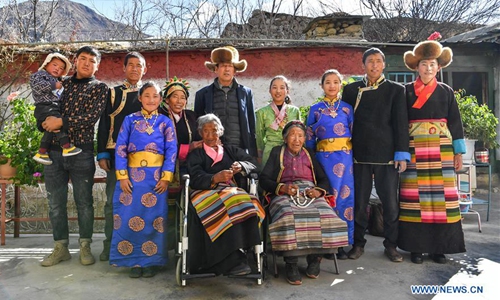
Sonam Drolma and her family pose for a group photo in Reguo Village of Gyaca County in Shannan, southwest China's Tibet Autonomous Region, March 24, 2020. Saturday marks the Serfs' Emancipation Day. Sixty-one years ago, more than one million people, or 90 percent of the region's population of that time, were liberated from the feudal serfdom. Sonam Drolma is a 109-year-old villager in Reguo Village of Shannan. Since she was born, she has gone through half a century of twists and turns and sufferings as a serf. As a descendant of serfs, Sonam Drolma began to work for serf owners at the age of 15. Sonam served as a serf for 47 years, witnessing her parents and brother die at an early age because of the overwork and poor living conditions. After the democratic reform, she owned the land, houses, cattle and sheep that she had never dreamed of. Since then, she never had to live the life being exploited and oppressed. Then Sonam Drolma gave birth to her daughter. After China's reform and opening up in early 1980s, Sonam Drolma's daughter Tsering Dzongpa picked up the baton of the family, going all out to make the family shake off poverty and have a well-off life by hard working. Sonam's family first contracted 11 mu (about 0.73 hectare) of land and seven walnut trees in the village. Then Tsering Dzongpa started to make a living by woolen weaving. Hard work brings rich returns. The family bought walking tractors, winnowing machines and other machinery one by one, and became the first family in the village to buy a car. Nowadays, Sonam's family produces more than 5,000 kilograms of grain and 700 kilograms of walnuts annually. If taking the income of woolen weaving into account, the annual income of her family is close to 100,000 yuan (about 14,096 U.S. dollars). The family has expanded their houses for five times. In 2017, they even spent 540,000 yuan (about 76,118 U.S. dollars) to build a new house with an area of 520 square meters. Photo:Xinhua
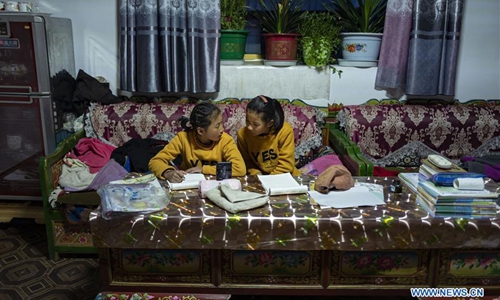
Great-granddaughters of Sonam Drolma have an online lesson in Reguo Village of Gyaca County in Shannan, southwest China's Tibet Autonomous Region, March 24, 2020. Saturday marks the Serfs' Emancipation Day. Sixty-one years ago, more than one million people, or 90 percent of the region's population of that time, were liberated from the feudal serfdom. Sonam Drolma is a 109-year-old villager in Reguo Village of Shannan. Since she was born, she has gone through half a century of twists and turns and sufferings as a serf. As a descendant of serfs, Sonam Drolma began to work for serf owners at the age of 15. Sonam served as a serf for 47 years, witnessing her parents and brother die at an early age because of the overwork and poor living conditions. After the democratic reform, she owned the land, houses, cattle and sheep that she had never dreamed of. Since then, she never had to live the life being exploited and oppressed. Then Sonam Drolma gave birth to her daughter. After China's reform and opening up in early 1980s, Sonam Drolma's daughter Tsering Dzongpa picked up the baton of the family, going all out to make the family shake off poverty and have a well-off life by hard working. Sonam's family first contracted 11 mu (about 0.73 hectare) of land and seven walnut trees in the village. Then Tsering Dzongpa started to make a living by woolen weaving. Hard work brings rich returns. The family bought walking tractors, winnowing machines and other machinery one by one, and became the first family in the village to buy a car. Nowadays, Sonam's family produces more than 5,000 kilograms of grain and 700 kilograms of walnuts annually. If taking the income of woolen weaving into account, the annual income of her family is close to 100,000 yuan (about 14,096 U.S. dollars). The family has expanded their houses for five times. In 2017, they even spent 540,000 yuan (about 76,118 U.S. dollars) to build a new house with an area of 520 square meters. Photo:Xinhua
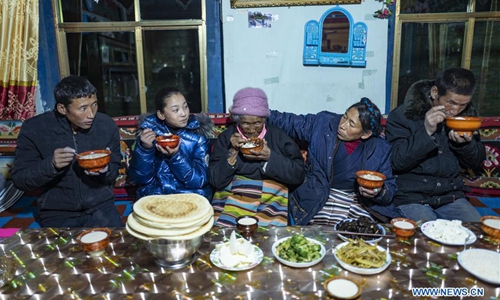
Sonam Drolma (C) and her family have a meal in Reguo Village of Gyaca County in Shannan, southwest China's Tibet Autonomous Region, March 24, 2020. Saturday marks the Serfs' Emancipation Day. Sixty-one years ago, more than one million people, or 90 percent of the region's population of that time, were liberated from the feudal serfdom. Sonam Drolma is a 109-year-old villager in Reguo Village of Shannan. Since she was born, she has gone through half a century of twists and turns and sufferings as a serf. As a descendant of serfs, Sonam Drolma began to work for serf owners at the age of 15. Sonam served as a serf for 47 years, witnessing her parents and brother die at an early age because of the overwork and poor living conditions. After the democratic reform, she owned the land, houses, cattle and sheep that she had never dreamed of. Since then, she never had to live the life being exploited and oppressed. Then Sonam Drolma gave birth to her daughter. After China's reform and opening up in early 1980s, Sonam Drolma's daughter Tsering Dzongpa picked up the baton of the family, going all out to make the family shake off poverty and have a well-off life by hard working. Sonam's family first contracted 11 mu (about 0.73 hectare) of land and seven walnut trees in the village. Then Tsering Dzongpa started to make a living by woolen weaving. Hard work brings rich returns. The family bought walking tractors, winnowing machines and other machinery one by one, and became the first family in the village to buy a car. Nowadays, Sonam's family produces more than 5,000 kilograms of grain and 700 kilograms of walnuts annually. If taking the income of woolen weaving into account, the annual income of her family is close to 100,000 yuan (about 14,096 U.S. dollars). The family has expanded their houses for five times. In 2017, they even spent 540,000 yuan (about 76,118 U.S. dollars) to build a new house with an area of 520 square meters. Photo:Xinhua
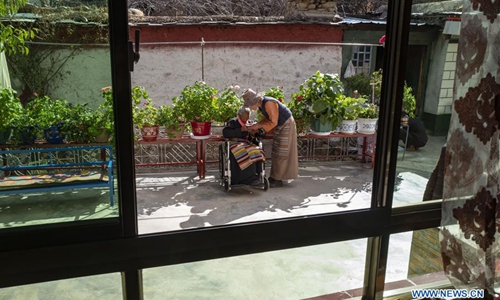
Sonam Drolma's granddaughter-in-law serves butter tea for her in Reguo Village of Gyaca County in Shannan, southwest China's Tibet Autonomous Region, March 24, 2020. Saturday marks the Serfs' Emancipation Day. Sixty-one years ago, more than one million people, or 90 percent of the region's population of that time, were liberated from the feudal serfdom. Sonam Drolma is a 109-year-old villager in Reguo Village of Shannan. Since she was born, she has gone through half a century of twists and turns and sufferings as a serf. As a descendant of serfs, Sonam Drolma began to work for serf owners at the age of 15. Sonam served as a serf for 47 years, witnessing her parents and brother die at an early age because of the overwork and poor living conditions. After the democratic reform, she owned the land, houses, cattle and sheep that she had never dreamed of. Since then, she never had to live the life being exploited and oppressed. Then Sonam Drolma gave birth to her daughter. After China's reform and opening up in early 1980s, Sonam Drolma's daughter Tsering Dzongpa picked up the baton of the family, going all out to make the family shake off poverty and have a well-off life by hard working. Sonam's family first contracted 11 mu (about 0.73 hectare) of land and seven walnut trees in the village. Then Tsering Dzongpa started to make a living by woolen weaving. Hard work brings rich returns. The family bought walking tractors, winnowing machines and other machinery one by one, and became the first family in the village to buy a car. Nowadays, Sonam's family produces more than 5,000 kilograms of grain and 700 kilograms of walnuts annually. If taking the income of woolen weaving into account, the annual income of her family is close to 100,000 yuan (about 14,096 U.S. dollars). The family has expanded their houses for five times. In 2017, they even spent 540,000 yuan (about 76,118 U.S. dollars) to build a new house with an area of 520 square meters. Photo:Xinhua
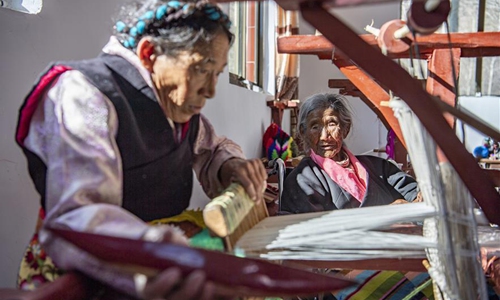
Tsering Dzongpa (L), accompanied by her mother Sonam Drolma, weaves woolen in Reguo Village of Gyaca County in Shannan, southwest China's Tibet Autonomous Region, March 24, 2020. Saturday marks the Serfs' Emancipation Day. Sixty-one years ago, more than one million people, or 90 percent of the region's population of that time, were liberated from the feudal serfdom. Sonam Drolma is a 109-year-old villager in Reguo Village of Shannan. Since she was born, she has gone through half a century of twists and turns and sufferings as a serf. As a descendant of serfs, Sonam Drolma began to work for serf owners at the age of 15. Sonam served as a serf for 47 years, witnessing her parents and brother die at an early age because of the overwork and poor living conditions. After the democratic reform, she owned the land, houses, cattle and sheep that she had never dreamed of. Since then, she never had to live the life being exploited and oppressed. Then Sonam Drolma gave birth to her daughter. After China's reform and opening up in early 1980s, Sonam Drolma's daughter Tsering Dzongpa picked up the baton of the family, going all out to make the family shake off poverty and have a well-off life by hard working. Sonam's family first contracted 11 mu (about 0.73 hectare) of land and seven walnut trees in the village. Then Tsering Dzongpa started to make a living by woolen weaving. Hard work brings rich returns. The family bought walking tractors, winnowing machines and other machinery one by one, and became the first family in the village to buy a car. Nowadays, Sonam's family produces more than 5,000 kilograms of grain and 700 kilograms of walnuts annually. If taking the income of woolen weaving into account, the annual income of her family is close to 100,000 yuan (about 14,096 U.S. dollars). The family has expanded their houses for five times. In 2017, they even spent 540,000 yuan (about 76,118 U.S. dollars) to build a new house with an area of 520 square meters.Photo:Xinhua